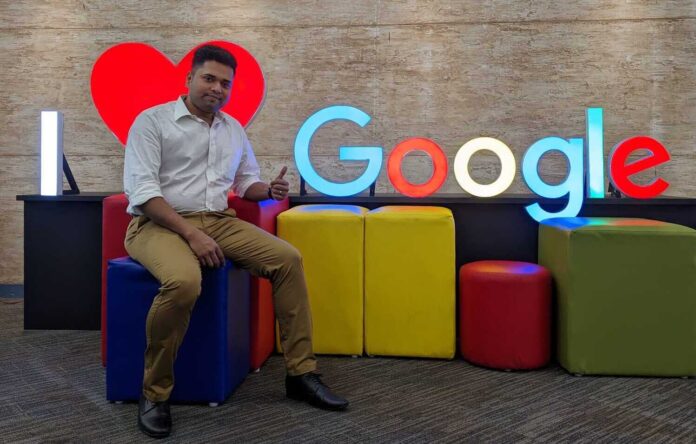Information technology’s explosive growth in the past two decades has revolutionized the way we live, work, and connect. This digital transformation offers remarkable opportunities for innovators, entrepreneurs and professionals alike. However, as our reliance on technology deepens, so does our vulnerability to cyberattacks and data theft. In this landscape, cybersecurity leaders like 38-year-old Debdutta Guha play a crucial role in safeguarding our digital lives.
Working as a Principal Strategist, Security and Privacy at Google New York, Debdutta Guha is a highly skilled professional with extensive experience in software engineering, data security, and privacy. He is currently leading the user data security and privacy efforts at Google, ensuring the privacy and protection of user information. Google recognised his dedication to excellence when he received the prestigious “Core Tech Impact Award” which is given out to only a small fraction of Google’s highly skilled technical workforce.
Debdutta Guha was born in the small town of Konnagar, nestled within West Bengal’s Hooghly district. While both his parents worked for the Life Insurance Corporation of India, his mind wandered elsewhere. Traditional lectures couldn’t hold his attention, but the intricate workings of electronic toys captivated him for hours.
He charted his own success story by building up his skill set while pursuing his Bachelor of Engineering in computer science from Bengaluru. He honed his skills further working with renowned tech giants like IBM, HP, Philips’ Security Center of Excellence, and Siemens. This journey of growth and expertise ultimately led him to Google. He worked at Google’s India office before being handpicked for a bigger role at New York in 2022. Let’s delve deeper into his success story.
How did you manage to reach Google based on your own set of skills?
My journey to Google has been quite interesting. I never actually applied for a job at Google, they found me through LinkedIn and reached out to me. Back when the internet was revolutionizing the world, Google’s relentless innovation inspired me. During my computer science engineering in Bangalore, I put extra effort to learn computer networks, software architecture and development, server deployments, the underlying mechanism of accessing a website(TCP/IP) etc. I also did a college project on DDoS attacks – a threat that still plagues websites today, though defenses have thankfully improved a lot.
I continued my learning in the field of cyber security in addition to my job and I had the privilege to work with some very talented people from whom I learned a lot. It’s that initiative, combined with a bit of luck, that brought me to Google.
Tell us about Google as a workplace?
Google is an exceptional workplace in my view. Despite its vast, matrixed structure, the energy is palpable – countless teams collaborate on groundbreaking work. You’re surrounded by top minds in their fields, fueling a culture of continuous learning. Google empowers employees with the freedom to explore innovative and unconventional solutions. As long as your decisions are backed by solid data, you’ll find the space to push boundaries.
India is a huge market and also a huge pool of talent, how do you see it?
India produces some of the best engineers, technically skilled labor and entrepreneurs and the world has realized that. From an employer’s perspective, you can find a highly talented workforce in India at very competitive rates. From the employee perspective, the US tech industry offers lucrative salaries and unmatched exposure, attracting the best minds from India and beyond. The talent density in India is quite high at present. Studying America’s trajectory from the 1950s reveals a similar recipe for success: exceptional talent, fierce competition, and supportive government policies. India is at an inflection point now and India’s rise as a tech powerhouse is undeniable, just a matter of when and how quickly it happens.
What’s your take on AI (Artificial Intelligence), Elon Musk says we must slow down?
AI-driven software has revolutionized the tech landscape, fueling a relentless race. AI is rapidly changing the technology landscape and how we interact with information.
However in this rush, the potential for errors and inaccuracies looms large. Plus we don’t give ourselves enough time to contemplate what should be done and what should not be done. I think that is what Elon Musk is alluding to when he says we must slow down.
Are there any regulations which can help regulate AI?
Currently, the responsibility for regulating AI models and content largely falls on the companies that create them – a responsibility they take seriously. However, governments worldwide recognize the urgent need for unified regulatory frameworks to manage this rapidly evolving field. Major democracies like Europe, the US, and India are actively developing guidelines and regulatory bodies. We need these regulations to ensure user consent, establish robust governance, and determine when to prioritize caution over speed. This is, undeniably, a trial-and-error stage for AI development.
The message is clear for Indian techies, the IT sector brims with endless possibilities. Seize them with unwavering passion and a relentless thirst for knowledge. In this ever-evolving landscape, stagnancy means falling behind. Embrace the challenge, stay ahead of the curve, and shape the future of technology.



